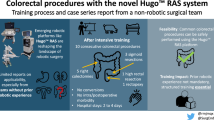Abstract
Background
Laparoscopic surgery is increasingly proposed as the gold standard technique for colorectal resections and is offered to greater numbers of patients. To meet the rising service demands, more trainees and established consultants need to learn the technique. We sought to establish whether it is feasible and safe to train on a large proportion of patients without adversely affecting clinical outcome or smooth running of clinical service.
Methods
Between September 2006 and July 2008, four senior trainees of the Wessex Specialist Registrar training rotation were involved in training in laparoscopic colorectal surgery. Major colorectal resections were separated into clearly defined modules for training purposes. Right and left hemicolectomies each comprised two modules, and low anterior resection comprised three modules. Prospective data on consecutive patients undergoing laparoscopic colorectal surgery were collected. Data included type of surgery, module of procedure performed by trainee or trainer, body mass index (BMI), conversion rates, median operative time, complications, length of hospital stay, and mortality.
Results
During the study period 227 colorectal resections were attempted laparoscopically. Of these, 216 (96%) proved suitable for training and 97% were completed laparoscopically. Some 23% of patients were American Society of Anesthesiologists score (ASA) ≥3; 35% had a BMI ≥28; 38% had a history of previous laparotomy. Trainees performed 96% (142/148) of right hemicolectomy modules, 99% (154/156) of left hemicolectomy modules, and 67% (128/192) of rectal resection modules. Each trainee was competent to do right and left hemicolectomy at the end of the training period. Four patients (2%) required further surgery for postoperative complications. Of the procedures completed by the trainees, 155/171 (91%) cancer resections were potentially surgically curative, and R0 resections were achieved in 99%. The readmission rate was 10% (22/216) and median length of hospital stay was 4 days. Postoperative mortality was zero.
Conclusions
Using a modular approach it is possible to provide effective training during almost all laparoscopic colorectal resections while achieving good clinical outcomes for the patients.
Similar content being viewed by others
References
http://www.nice.org.uk/nicemedia/pdf/TA105guidance.pdf. Accessed 6 March 2010
Lacy AM, Garcia-Valdecasas JC, Delgado S et al (2002) Laparoscopy-assisted colectomy versus open colectomy for treatment of non-metastatic colon cancer: a randomised trial. Lancet 359:2224–2229
Guillou PJ, Quirke P, Thorpe H et al (2005) Short-term endpoints of conventional versus laparoscopic-assisted surgery in patients with colorectal cancer (MRC CLASICC trial): multicentre randomised controlled trial. Lancet 365:1718–1726
King PM, Blazeby JM, Ewings P et al (2006) Randomized clinical trial comparing laparoscopic and open surgery for colorectal cancer within an enhanced recovery programme. Br J Surg 93:300–308
Veldkamp R, Kuhry E, Hop WC et al (2005) Laparoscopic surgery versus open surgery for colon cancer: short-term outcomes of a randomised trial. Lancet Oncol 6:477–484
http://www.alsgbi.org/. Accessed 6 March 2010
http://www.lapco.nhs.uk/. Accessed 6 March 2010
Tekkis PP, Senagore AJ, Delaney CP et al (2005) Evaluation of the learning curve in laparoscopic colorectal surgery: comparison of right-sided and left-sided resections. Ann Surg 242:83–91
Tekkis PP, Senagore AJ, Delaney CP (2005) Conversion rates in laparoscopic colorectal surgery: a predictive model with 1253 patients. Surg Endosc 19:47–54
Pikarsky AJ, Saida Y, Yamaguchi T et al (2002) Is obesity a high-risk factor for laparoscopic colorectal surgery? Surg Endosc 16:855–858
Arteaga Gonzalez I, Martin Malagon A et al (2006) Impact of previous abdominal surgery on colorectal laparoscopy results: a comparative clinical study. Surg Laparosc Endosc Percutan Tech 16:8–11
Lund L, Dubrowski A, Carnahan H (2007) A modular approach for training urologists in laparoscopy. BJU Int 100:1216–1218
Stolzenburg JU, Schwaibold H, Bhanot SM et al (2005) Modular surgical training for endoscopic extraperitoneal radical prostatectomy. BJU Int 96:1022–1027
Bonatti J, Schachner T, Bernecker O et al (2004) Robotic totally endoscopic coronary artery bypass: program development and learning curve issues. J Thorac Cardiovasc Surg 127:504–510
Marks JH, Kawun UB, Hamdan W et al (2008) Redefining contraindications to laparoscopic colorectal resection for high-risk patients. Surg Endosc 22:1899–1904
Buchanan GN, Malik A, Parvaiz A et al (2008) Laparoscopic resection for colorectal cancer. Br J Surg 95:893–902
http://www.alsgbi.org/training_programmes/preceptorship_programme/index.htm. Accessed 6 July 2010
http://www.lapco.nhs.uk/training-centres/imperial-college.php#Certification. Accessed 6 July 2010
Renwick AA, Bokey EL, Chapuis PH (2005) Effect of supervised surgical training on outcomes after resection of colorectal cancer. Br J Surg 92:631–636
Ganzer R, Rabenalt R, Truss MC et al (2008) Evaluation of complications in endoscopic extraperitoneal radical prostatectomy in a modular training programme: a multicentre experience. World J Urol 26:587–593
Author information
Authors and Affiliations
Corresponding author
Rights and permissions
About this article
Cite this article
Hemandas, A., Flashman, K.G., Farrow, J. et al. Modular Training in Laparoscopic Colorectal Surgery Maximizes Training Opportunities without Clinical Compromise. World J Surg 35, 409–414 (2011). https://doi.org/10.1007/s00268-010-0837-1
Published:
Issue Date:
DOI: https://doi.org/10.1007/s00268-010-0837-1




